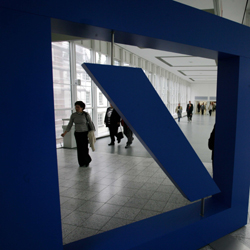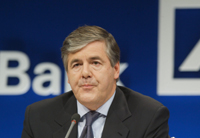Politics
Cabinet approves bill limiting bonus payments
The German federal cabinet in mid February approved a bill new regulating bankers’ bonuses, which is to come into force by October this year at latest and apply to both banks and insurance companies. The government is thus giving legal form to a G20 resolution calling for responsible, transparent remuneration systems. The new Act is to give the Federal Institution for Financial Services Oversight (BaFin) the right to limit inappropriately high bonus payments or forbid them entirely. The amendment is to make a considerable proportion of variable remuneration payable only after at least three years and dependent on business success. At least half the variable remuneration must be paid out in the form of shares or similar instruments. Guaranteed bonuses are, according to the draft, permissible only in exceptional cases. The technical details of the Act such as monitoring and further development of remuneration systems are to be embodied in a legal decree after the Act comes into force.
More women on Supervisory Boards
The Corporate Governance Commission is calling for more diversity on German Supervisory Boards and warning that in German firms women, and other nationalities, are still underrepresented on them. Currently only some twelve percent of German Supervisory Board members are women. While on the employee side there are relatively many women, the female sex has not been given appropriate consideration on the shareholder side. Klaus-Peter Müller, chair of the Commission and also Supervisory Board chair of Commerzbank, indicated in an interview with Financial Times Deutschland that the Commission would likely discuss a recommendation on a stronger female presence at its next meeting in May. While there is to be no quota or specific figure, as in Norway, firms should make their own plans as to how many women, and if appropriate foreign experts, they plan to appoint, and in what time frames.
Offensive against credit crunch
 Deutsche Bank wants to set up an aid fund for German small businesses still in this first quarter, endowed initially with €300 million. A further 200 million are to be paid in by other banks and companies. Carmaker Daimler has indicated a possible amount, which would benefit the suffering automotive supplier industry. The fund is to support companies with a turnover of up to €100 million. They are to receive credits in the form of mezzanine capital amounting to between two and ten million euros each. Financial and real-estate firms are excluded. The fund, administered by Frankfurt service provider M Cap Finance, can waive interest payments where a company is making losses. The Bundesverband der Deutschen Industrie (BDI) had earlier criticized the delays in setting up the fund, proposed in December by Deutsche Bank CEO Josef Ackermann. The Deutsche Sparkassen- und Giroverband announced a fund of its own that might be endowed with five to ten billion euros. To flank the private fund, the federal government has created the position of a credit mediator. As from March Hans-Joachim Metternich will fill this post. For its part, Commerzbank has appointed Michael Schmid as special board representative for small-business credit. He is to look into rejected credits and act as interlocutor for Metternich.
Deutsche Bank wants to set up an aid fund for German small businesses still in this first quarter, endowed initially with €300 million. A further 200 million are to be paid in by other banks and companies. Carmaker Daimler has indicated a possible amount, which would benefit the suffering automotive supplier industry. The fund is to support companies with a turnover of up to €100 million. They are to receive credits in the form of mezzanine capital amounting to between two and ten million euros each. Financial and real-estate firms are excluded. The fund, administered by Frankfurt service provider M Cap Finance, can waive interest payments where a company is making losses. The Bundesverband der Deutschen Industrie (BDI) had earlier criticized the delays in setting up the fund, proposed in December by Deutsche Bank CEO Josef Ackermann. The Deutsche Sparkassen- und Giroverband announced a fund of its own that might be endowed with five to ten billion euros. To flank the private fund, the federal government has created the position of a credit mediator. As from March Hans-Joachim Metternich will fill this post. For its part, Commerzbank has appointed Michael Schmid as special board representative for small-business credit. He is to look into rejected credits and act as interlocutor for Metternich.
All are in favour of bank levy
The panel of experts (SVR) is calling for banks to pay money into a fund in accordance with their systemic risk. The demand to involve credit institutions in the consequences of the financial crisis was also taken up by the chair of the Bavarian CSU, Horst Seehofer: “Those who can pay bonuses can also bear a levy to the public.” The Bundesverband deutscher Banken (BdB) was also open to a special levy. The Deutsche Sparkassen- und Giroverband (DSGV) said it was in agreement in principle, but warned the levy had to be fair in terms of causality. Finance Minister Wolfgang Schäuble now intends by the end of May to submit a draft regulating financial markets that might contain a compulsory levy on banks. The institutions would then be asked to pay retroactively for their rescue. It is unclear whether any proceeds would go into the already existing rescue fund (SoFFin) or be used to settle costs of the financial crisis.
Bigger rescue fund at work
 Josef Ackermann, in his capacity as chair of international banking association IIF, called at the World Economic Forum in Davos for more banker initiative to prevent future financial crises. The Deutsche Bank CEO repeated his call for European banks and governments to pay into a jointly financed European fund that could rescue or wind up institutions in difficulty. Financial Times Deutschland reports that the European Commission has produced a working paper intended to harmonize rules for investment insurance systems in Member States. This system’s resources are to be beefed up within ten years from their current €23 billion to €170 billion. Three quarters of the amount is to be paid in beforehand by credit institutions, with a further quarter to follow as required. Institutions would then have to pay three to five times as much into safety systems as before. According to an internal estimate of consequences, the new system could cut bank profits by up to ten percent. Currently there is a legal deposit guarantee fund in Germany that protects private customers, and a voluntary protection fund by private banks that also guarantees institutional and public investors. The Landesbanks and savings banks guarantee each other. New EU internal market commissioner Michel Barnier will present official proposals for a comprehensive reform of investment protection in spring.
Josef Ackermann, in his capacity as chair of international banking association IIF, called at the World Economic Forum in Davos for more banker initiative to prevent future financial crises. The Deutsche Bank CEO repeated his call for European banks and governments to pay into a jointly financed European fund that could rescue or wind up institutions in difficulty. Financial Times Deutschland reports that the European Commission has produced a working paper intended to harmonize rules for investment insurance systems in Member States. This system’s resources are to be beefed up within ten years from their current €23 billion to €170 billion. Three quarters of the amount is to be paid in beforehand by credit institutions, with a further quarter to follow as required. Institutions would then have to pay three to five times as much into safety systems as before. According to an internal estimate of consequences, the new system could cut bank profits by up to ten percent. Currently there is a legal deposit guarantee fund in Germany that protects private customers, and a voluntary protection fund by private banks that also guarantees institutional and public investors. The Landesbanks and savings banks guarantee each other. New EU internal market commissioner Michel Barnier will present official proposals for a comprehensive reform of investment protection in spring.
Short-selling allowed again
Since early February, so-called uncovered short sales are allowed again on Germany’s exchanges. However, as from 25 March a new transparency system will apply to shares of Aareal, Allianz, Commerzbank, Deutsche Bank, Deutsche Börse, Hanover Re, MLP, Munich Re and Postbank. As soon as market participants hold 0.2 percent of the shares as short-selling positions (after deducting long positions), they must report this to BaFin. Further disclosures must follow on reaching, exceeding and going below each further 0.1 percent of shares issued. As from 0.5 percent the position must be disclosed in anonymized form on the BaFin website. Bafin wants here also to include on- and off-exchange instruments that correspond to a short position.















